Countries should be clear in their support for Taiwan and deepen economic ties to escape Chinese coercion, former US secretary of state Mike Pompeo said in an interview with the Taipei Times on Tuesday.
The former top US diplomat, who is on his second visit to Taiwan this year after traveling to Taipei in March, is in Kaohsiung to meet with business leaders at the Global Taiwan Business Forum.
Speaking on the sidelines of the event, Pompeo stressed economic integration in tandem with defense as key to maintaining Taiwan’s extant independence — a reality that he called “patently obvious.”
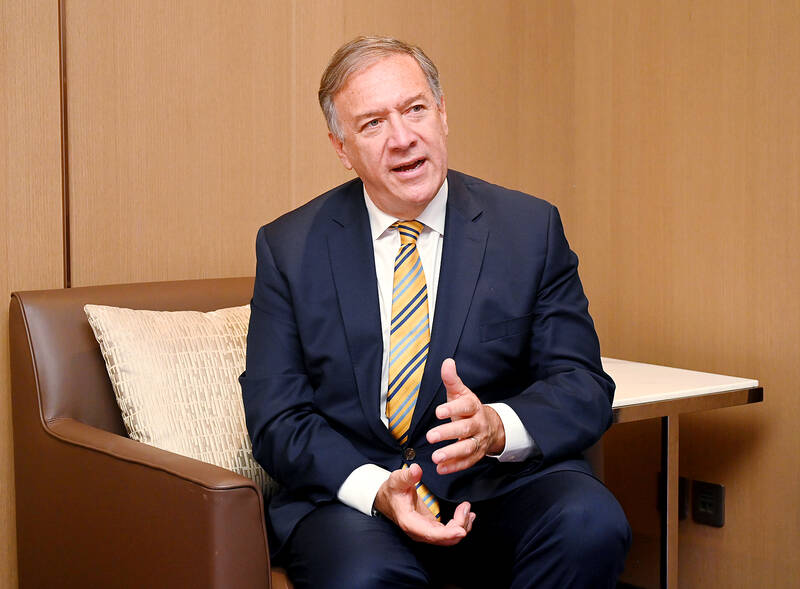
Photo: Tien Yu-hua, Liberty Times
“The Chinese Communist Party [CCP] uses as its primary instrument of power its economic might,” he said. “Those of us who believe in basic rule of law should unite to prevent them from picking us off one after the other.”
Beijing is sophisticated in its strategy to single out its competitors, for instance by refusing to buy Australian wine, restricting travel to Pacific islands or banning Taiwanese products, he said.
The answer is for democracies to deepen trade with each other, denying China its economic leverage, he said.
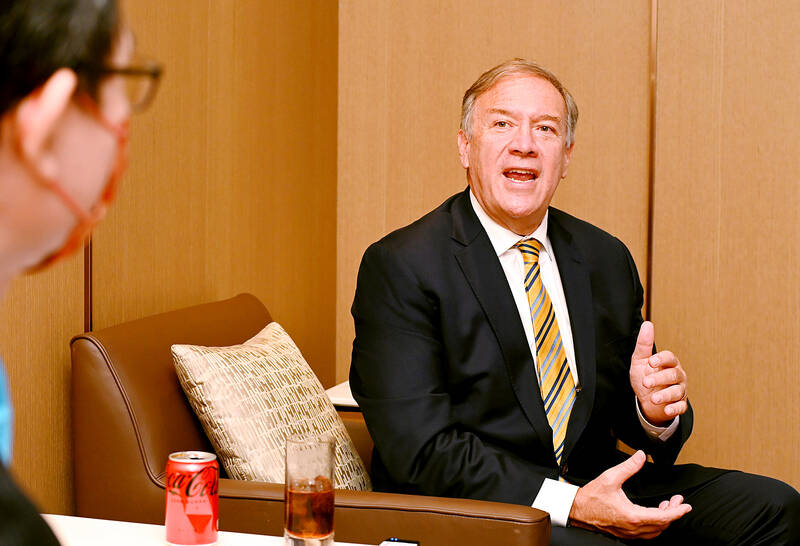
Photo: Yang Yi-fu, Liberty Times.
At the same time, businesses are starting to decouple from China as they realize that its “holy grail” of a 1.4 billion-strong market has proven elusive, Pompeo said.
“I get it. People want to pursue that market,” but they should be prudent about the risks and investigate ways to slowly reduce exposure to China, he said.
“If you’re going to deploy capital and resources, do you want to deploy them in a country that may steal them? That may take your intellectual property, that may take your facility over?” he asked.
People should not wait for a Taiwan-US free-trade agreement to bring the two countries closer together, he said.
Economic integration is just one part of a multipronged strategy to reduce risk through advance preparation, he said.
Clarity regarding Taiwan and its place in the world is also crucial, including formal recognition of its sovereignty, he added.
“All of the eidos of sovereignty are possessed here. I think that the United States simply acknowledging that reality would reduce risk in the region,” Pompeo said, reiterating a call he made during his visit in March.
“When you’re in the mushy middle, when you’re in that place where there is an absence of clarity, the bad guys will push. They will continue to try and extend until they meet resistance,” he added. “We ought to provide that resistance.”
As for Beijing’s reaction to US House of Representatives Speaker Nancy Pelosi’s visit to Taipei early last month, Pompeo said it reveals the CCP’s “fragility.”
“I watched the Chinese Communist Party overreact to a visit from a member of Congress to Taiwan. That’s just crazy stuff. That shows weakness,” he said.
Paired with its prosecution of 90-year-old retired Cardinal Joseph Zen (陳日君), media mogul Jimmy Lai (黎智英) and others, these actions “evince a real fragility, a real fear in the leadership” of the CCP, he said.
Looking ahead, Pompeo does not foresee a change in the US’ “blessedly nonpartisan” policy toward Taiwan with any potential transfer of power in the White House.
Yet strong ties between democracies — military, economic and diplomatic — must be pursued as soon as possible, he said.
“The hard work doesn’t come the day the Chinese do something stupid. The hard work happens today,” he said.
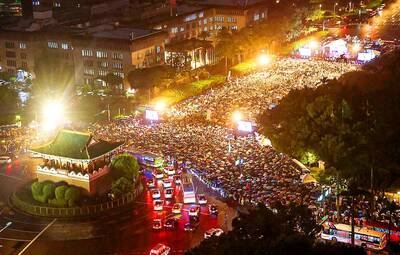
FINAL COUNTDOWN: About 50,000 attended a pro-recall rally yesterday, while the KMT and the TPP plan to rally against the recall votes today Democracy activists, together with arts and education representatives, yesterday organized a motorcade, while thousands gathered on Ketagalan Boulevard in Taipei in the evening in support of tomorrow’s recall votes. Recall votes for 24 Chinese Nationalist Party (KMT) lawmakers and suspended Hsinchu City mayor Ann Kao (高虹安) are to be held tomorrow, while recall votes for seven other KMT lawmakers are scheduled for Aug. 23. The afternoon motorcade was led by the Spring Breeze Culture and Arts Foundation, the Tyzen Hsiao Foundation and the Friends of Lee Teng-hui Association, and was joined by delegates from the Taiwan Statebuilding Party and the Taiwan Solidarity
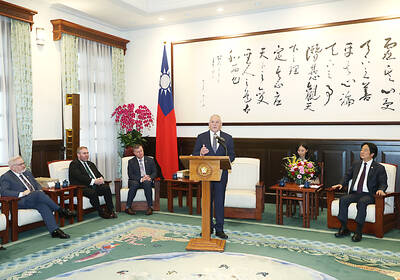
‘NON-RED’: Taiwan and Ireland should work together to foster a values-driven, democratic economic system, leveraging their complementary industries, Lai said President William Lai (賴清德) yesterday expressed hopes for closer ties between Taiwan and Ireland, and that both countries could collaborate to create a values-driven, democracy-centered economic system. He made the remarks while meeting with an Irish cross-party parliamentary delegation visiting Taiwan. The delegation, led by John McGuinness, deputy speaker of the Irish house of representatives, known as the Dail, includes Irish lawmakers Malcolm Byrne, Barry Ward, Ken O’Flynn and Teresa Costello. McGuinness, who chairs the Ireland-Taiwan Parliamentary Friendship Association, is a friend of Taiwan, and under his leadership, the association’s influence has grown over the past few years, Lai said. Ireland is

Instead of threatening tariffs on Taiwan-made chips, the US should try to reinforce cooperation with Taiwan on semiconductor development to take on challenges from the People’s Republic of China (PRC), a Taiwanese think tank said. The administration of US President Donald Trump has threatened to impose across-the-board import duties of 32 percent on Taiwan-made goods and levy a separate tariff on semiconductors, which Taiwan is hoping to avoid. The Research Institute for Democracy, Society, and Emerging Technology (DSET), a National Science and Technology Council think tank, said that US efforts should focus on containing China’s semiconductor rise rather than impairing Taiwan. “Without
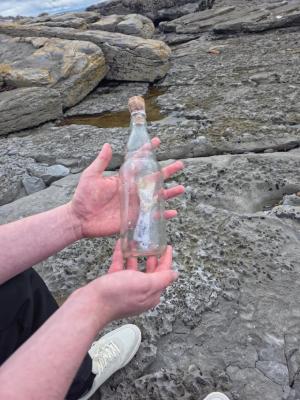
An SOS message in a bottle has been found in Ireland that is believed to have come from the Taiwanese captain of fishing vessel Yong Yu Sing No. 18 (永裕興18號), who has been missing without a trace for over four years, along with nine Indonesian crew members. The vessel, registered to Suao (蘇澳), went missing near Hawaii on Dec. 30, 2020. The ship has since been recovered, but the 10 crew members have never been found. The captain, surnamed Lee (李), is believed to have signed the note with his name. A post appeared on Reddit on Tuesday after a man